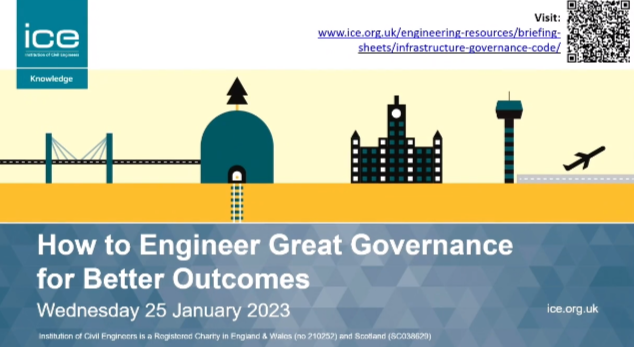Insight from the event: “How to engineer great governance for better outcomes”, which marked the launch of the ICE’s Infrastructure Governance Code on the 25th of January 2023.

The code itself very clearly describes the context into which it is launched: the complexity of delivering major infrastructure projects and programmes is more than can be solved by traditional approaches. As an industry, we are faced with the need to change our ways of working to be able to effectively address the critical challenges of our time. The code is embedded in Project 13’s governance pillar and presents an opportunity to again bring attention to the enterprise model, and a better means of organising projects to deliver outcomes.
“This Code provides a structured system of good practice and challenge that creates the right environment to support effective decision-making.” – The Infrastructure Governance Code
The structure of the code provides a ready-made framework for organisations and project teams looking to organise themselves in the manner of Project 13. Below we explore a few reflections on some of the themes discussed at the launch event.
Front-end loading
Reiterating the message of his blog ‘Setting up for success: The importance of Front-End loading’, Nick Smallwood highlighted the importance of investing time and resource early on in a project to plan effectively and review the desired approach, before diving into delivery. This continues to be a key theme across industry best practice, recently highlighted in the Construction Playbook. During the event, Dr Simon Addyman also noted that there are many well-documented case studies in which the benefits of front-end loading to achieve the project or programme outcomes are clearly demonstrated. The question then remains, why is it difficult, at the initiation stage of so many projects and programmes, to resist the urge to rush into delivery?
We often talk about the need for diverse thinking within our teams. For me, this is another situation where we must recognise that the lack of diversity in skills across our teams is damaging our ability to deliver the best outcomes. If major project teams are over-represented at the initiation stage by those who are enthusiastic about delivery, they can overwhelm the voices of those who would spend more time developing ideas, designing and testing solutions, and assessing and reassessing whether the plans we have put together will take us to where we want to go!
Front-end loading is, in many ways, about getting the appropriate balance of these skills at each stage of the project lifecycle. This happens through creating the right environment and setting up the team, decision-making and governance processes. All with the outcome of the project at the centre.
Professional responsibility to do our best
David Porter, Vice President of the ICE reminded us of the mission of the institution, and the call to civil engineering professionals to always do their best for society. This commitment and belief in the importance of the role that civil engineering and infrastructure delivery play in society is often a strong driver for the move towards zero carbon and more sustainable use of materials, but what could it have to do with governance?
The persistent feature of all our infrastructure challenges, whether economic, environmental, social or otherwise, appears to be increasing complexity. Instead of a single problem, where a traditional approach to finding one solution would suffice, we are now trying to solve a much more interlinked set of problems that are constantly changing. Our response must therefore reflect the complexity, meaning that we must have both resilience and flexibility in our ways of working – including governance – so that it doesn’t simply break under the strain of change.
The inclusion of behaviours and accountabilities in the code is vital in acknowledging this need for resilience and flexibility. Much of what is needed is less about incremental improvement, and more about a change in approach, which as we have seen from the changes in safety culture in construction, is highly dependent on behaviours and accountabilities. The principles very clearly set requirements for the social competence of the governing body, to be able to make effective decisions in a complex, dynamic environment. It sets the expectation that, much like the technical and commercial elements, the social competency of leaders is not left to chance; expectations are articulated, and the right individuals are sought out, supported, and developed. Sue Kershaw shared an example of a board of directors who engaged an independent coach and expressed the value that they gained from having someone who was able to provide objective reflection, enable self-evaluation and help the group understand the effective and ineffective ways in which they were working together. This is the essence of our approach to working with project teams – sitting on the edge of the team, board, or leadership group where it is possible to be fully committed to the project outcome while having enough independence from the internal systems to provide valuable insight into them.
The governance code, along with the rest of the Project 13 ethos and maturity model, provides the industry with a framework to safely challenge the way that things have always been done in order to deliver better outcomes for the benefit of society, now and in the future.
You can download a copy of the new governance code here, or catch up on the presentations from the launch event on the ICE website.
